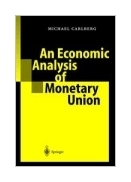|
||
• wydawnictwa polskie
• Zamów informacje o nowościach z wybranego tematu • kontakt
• Cookies na stronie |
AN ECONOMIC ANALISIS OF MONETARY UNION.CARLBERG M.wydawnictwo: SPRINGER , rok wydania 2001, wydanie Icena netto: An Economic Analysis of Monetary Union2001. XV, 255 pp. 21 figs.,
22 tabs. Hardcover Contents: The Small Union as a Whole: Fixed Money Wages.- Flexible Money Wages.- Slow Money Wages.- The Small Union of Two Countries: Fixed Money Wages.- Flexible Money Wages.- Fixed Money Wages in Germany, Flexible Money Wages in France.- Slow Money Wages.- Different Behavioural Functions.- The World as a Whole: Fixed Money Wages.- Flexible Money Wages.- The World of Two Regions: Fixed Money Wages.- Flexible Money Wages.- Fixed Money Wages in Europe, Flexible Money Wages in America. Księgarnia nie działa. Nie odpowiadamy na pytania i nie realizujemy zamówien. Do odwolania !. |


